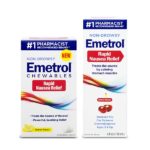
What is Nausea?
Nausea is the uneasy sensation that you need to vomit, although it does not always lead to vomiting. Common causes of nausea include a viral infection often referred to as “stomach flu,” motion sickness or seasickness, eating or drinking too much, food poisoning, and pregnancy.
Nausea Remedies

Emetrol Liquid is an over-the-counter medication for relieving nausea associated with upset stomach. Emetrol Chewables is an OTC Chewable tablets for nausea in adults associated with overindulgence for food and drink. Both are pharmacist-recommended nausea remedies. Learn more about Emetrol.
Ginger is available in capsules, powder, tea, ginger ale, and other forms. Children under age 2 should not be given ginger. Ginger may relieve nausea during pregnancy, but pregnant women should talk to their doctors before taking ginger.
Wrist Acupressure can be applied by pressing your middle and index fingers firmly down on the groove between the two large tendons on the inside of your wrist. Acupressure wristbands available in stores press on similar pressure points.
Prescription Medications may be used under the direction of a physician where nausea treatment is indicated for certain patients.
Not All Stomach
Medicines Are for Nausea
Antacids, for instance, are for heartburn and stomach acid, not specifically for nausea*. Some other stomach medicines contain aspirin or other ingredients inappropriate for children under age 12. If you’re unsure whether a certain over-the-counter medicine treats nausea or is right for you, ask your pharmacist.
Other Ways to
Manage Nausea Symptoms
When you feel nauseated, a bit of self-care can also help prevent vomiting:
- Avoid activity—Moving around can make your nausea worse or lead to vomiting
- Stay seated or lie down with your head propped up
- Avoid food smells
*According to product labeling

How to Settle an Upset Stomach

